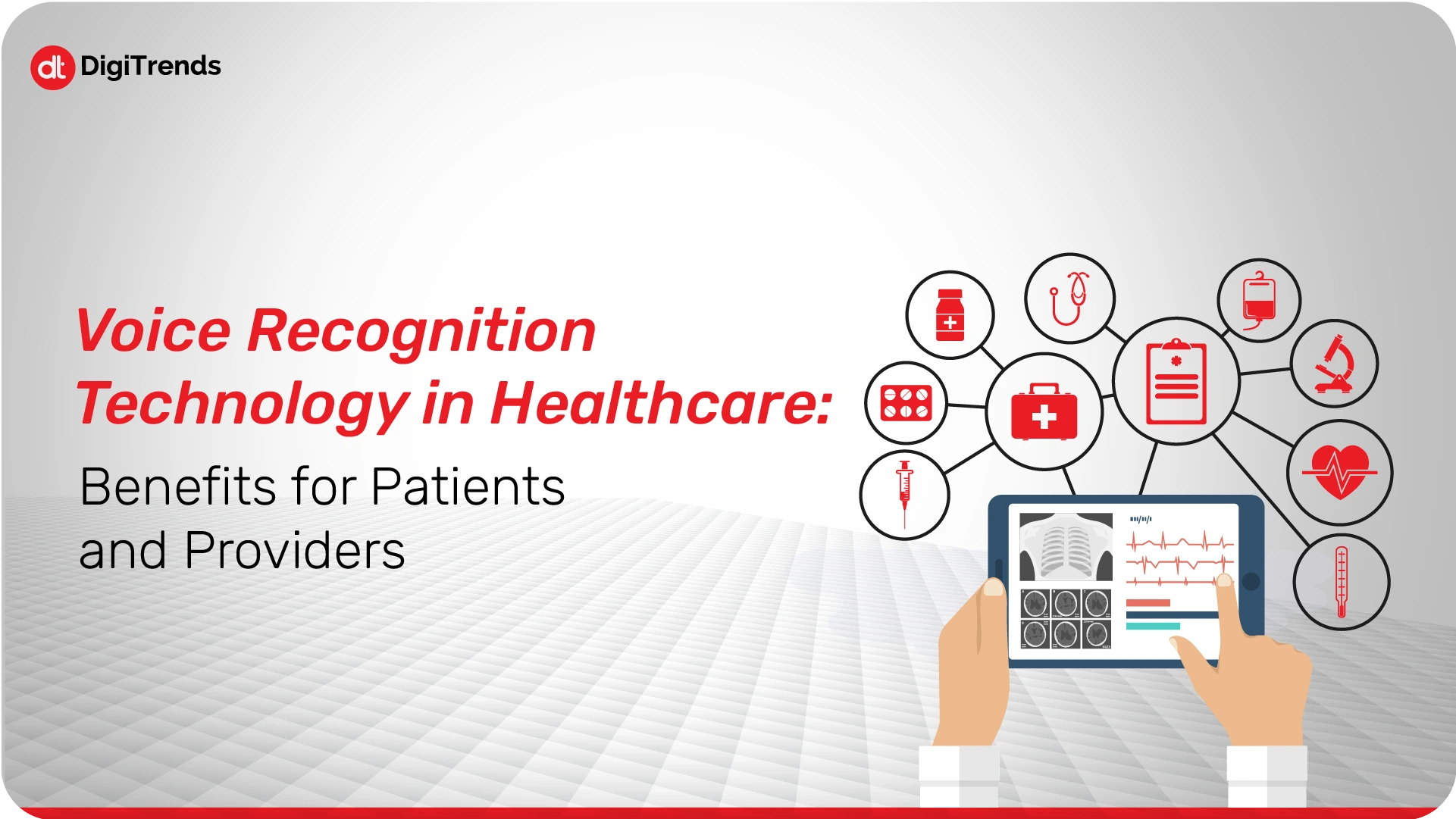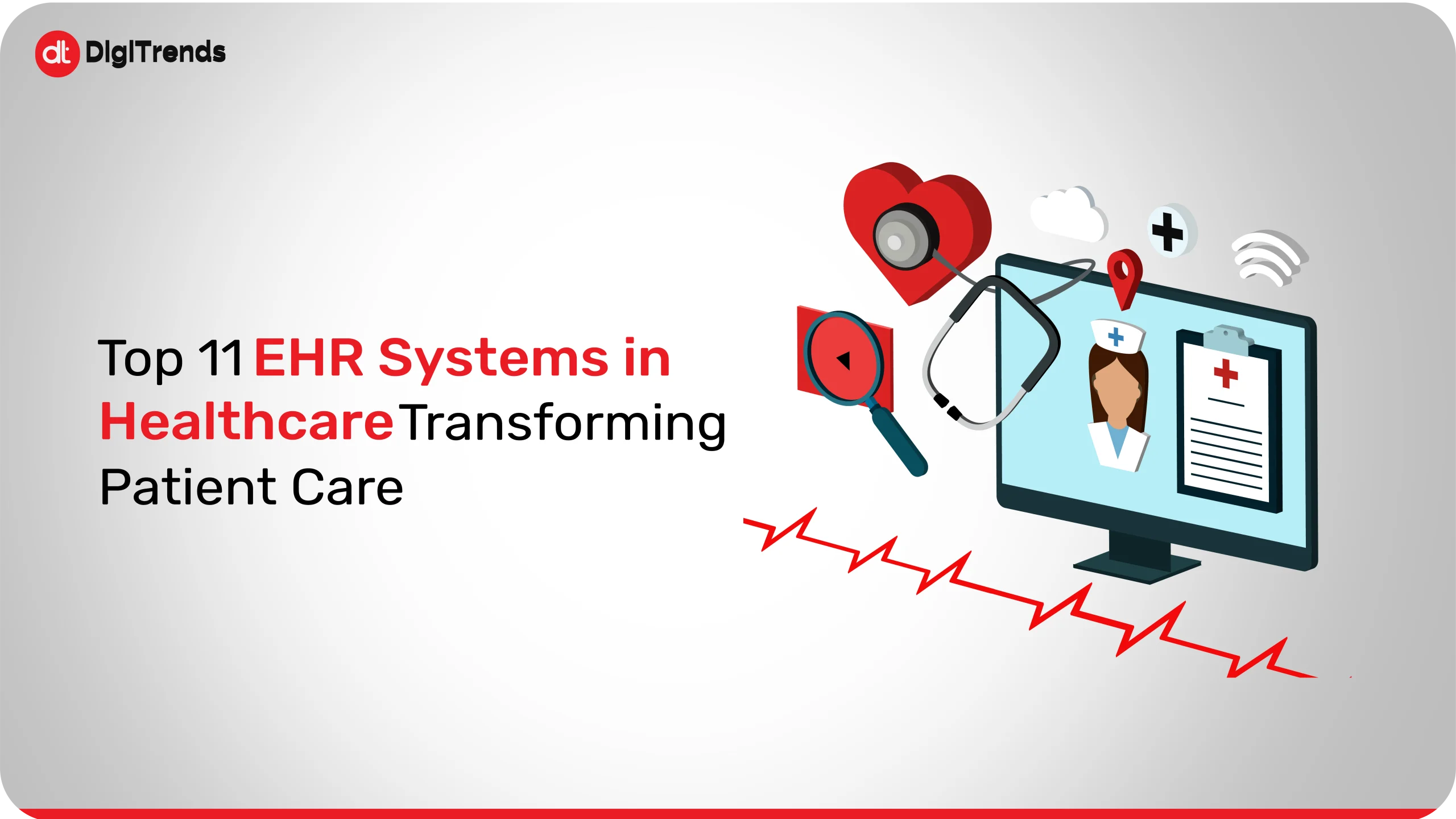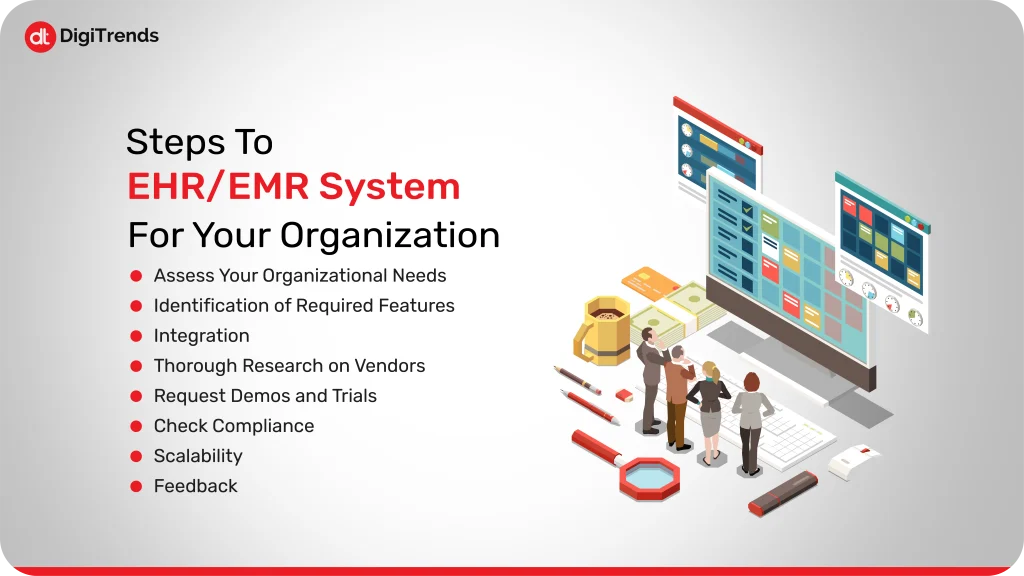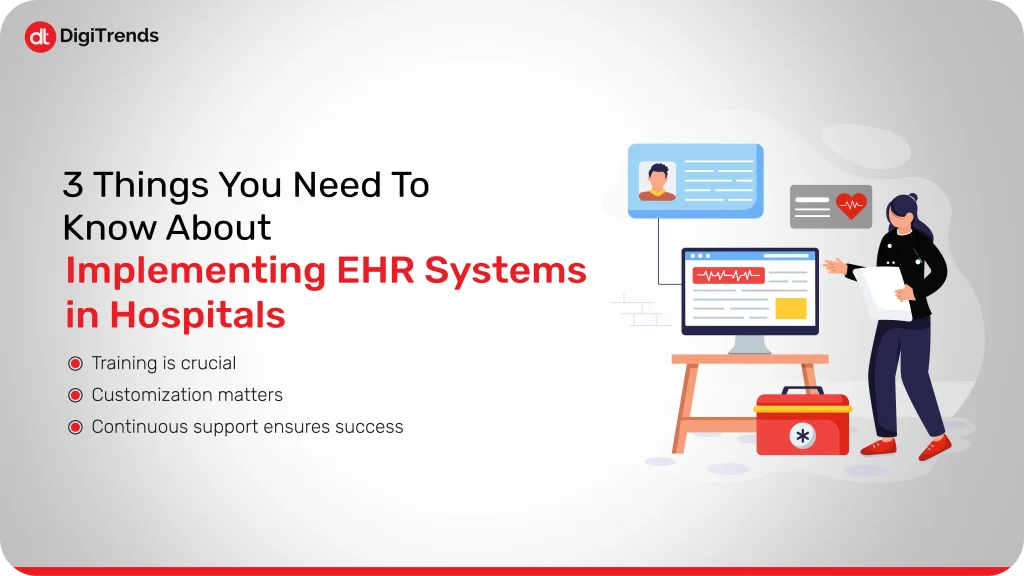
Voice Recognition Technology in Healthcare: Benefits for Patients and Providers
Explore how voice recognition technology is being used across healthcare and the role of voice assistants in clinical environments.
Continue Reading
Ever wondered how hospitals keep track of a vast amount of information, such as tests, prescriptions, and patient visits, without being overwhelmed by paperwork?
Hospitals use Electronic Health Record (EHR) systems to store, access, and share patient information.
So, instead of going through a ton of files or spreadsheets, doctors, nurses, and staff can now easily view complete medical records of a patient in just a few clicks. The digitized version of the data is faster, more accurate, and easier to manage.
However, finding the right EHR system can be tricky for healthcare organizations, as some are designed for large hospital networks, while others are made according to the small clinic workflows that require simple and efficient solutions.
Explore the 11 best EHR systems in healthcare, what makes each one stand out, what benefits they bring, and how they’re helping healthcare providers deliver better care every day.
Before we explore the 11 best EHR systems in healthcare, it is important to understand how they work and help in storing patients’ medical information.
EHR systems are basically digital platforms where healthcare organizations can easily store all the data of the patient. So, instead of maintaining separate files, hospitals can use these systems to record all the data, including diagnoses, lab results, and even treatment histories.
These digital systems help in improving the patient data accuracy by reducing errors, and they also make it easier for healthcare providers to access any information instantly.
In simple words, an EHR system is a centralized system that is secure and accessible for healthcare providers to manage patient care digitally.
Hospitals have steadily adopted EHR systems into their operations worldwide. As of now, many healthcare facilities use these systems to manage patient medical information. Let’s have a look at some of the most common EHR systems used in hospitals:
| Electronic Health Record (EHR) | Market Share (%) |
| Epic Systems | 28.21% |
| Allscripts | 9.21% |
| eClinicalWorks | 6.57% |
| Athenahealth | 6.03% |
| NextGen Healthcare | 5.37% |
| GE Healthcare (Centricity) | 5.00% |
| Cerner Corporation | 4.32% |
| Greenway Health | 2.91% |
| Meditech | 2.50% |
| PracticeFusion | 2.10% |
| AdvancedMD | 1.85% |
While larger hospitals are increasingly adopting advanced EHR systems like those offered by Epic and Cerner, about 80% of critical access and rural hospitals have reported using at least basic EHR systems. Additionally, various EHR software options are available for mental health services.
Now that you know how the world is now moving towards digitized records to provide the best care to patients, let’s have a look at the top EHR systems examples.
Epic is one of the most widely used EHR systems in hospitals and large healthcare organizations, as it provides modules for clinical documentation, patient scheduling, billing, population health, and telehealth.
Benefits:
Value Proposition:
Epic offers an all-in-one platform that helps large organizations manage patient data efficiently while also maintaining regulatory compliance and improving patient care.
This platform is known as Oracle (Formerly Cerner), and it focuses on data-driven insights and interoperability by easily integrating with other hospital systems and supporting both inpatient and outpatient care.
Benefits:
Value Proposition:
The biggest strength of this platform is its data capabilities and its focus on improving care coordination in complex healthcare ecosystems.
The NextGen platform is known for serving small to medium-sized practices. Hospitals can integrate practice management tools, EHR capabilities, and patient engagement features through this platform.
Benefits:
Value Proposition:
NextGen is a great platform for smaller healthcare providers. It can provide them with powerful tools that rival enterprise systems, without overwhelming them with complex processes.
eClinicalWorks is a platform that offers a cloud-based EHR system that includes telehealth, population health, and patient engagement solutions.
Benefits:
Value Proposition:
This platform focuses on improving efficiency for medical practices through automation, analytics, and real-time collaboration.
Allscripts offers healthcare organizations solutions for EHR, practice management, and revenue cycle management.
Benefits:
Value Proposition:
Allscripts is a platform designed for flexibility; it provides healthcare organizations the freedom to build customized systems that can match their workflow and size.
This platform, called Praxis EMR, stands out for its AI-driven “concept processing” technology that adapts to how doctors work instead of forcing them to follow fixed templates.
Benefits:
Value Proposition:
This platform is focused on providing user efficiency, which helps doctors spend less time on documentation and more on patient care.
CPSI provides EHR solutions that are specifically designed for rural and community hospitals. Its software includes clinical, financial, and administrative management features.
Benefits:
Value Proposition:
CPSI enables smaller healthcare institutions to access advanced EHR capabilities without the high cost or complexity of enterprise platforms.
Athenahealth is a cloud-based platform, and it is known for its intuitive interface and integration capabilities. It offers EHR, medical billing, and patient engagement tools.
Benefits:
Value Proposition:
Athenahealth provides healthcare providers with a connected, data-driven platform that helps them simplify their operations and improve patient outcomes.
Meditech has been a trusted name when it comes to EHR examples. It offers a unified platform that integrates clinical, administrative, and financial systems.
Benefits:
Value Proposition:
Meditech is a reliable platform, which is why it is a go-to choice for healthcare organizations that want a stable and well-supported system.
Practice Fusion offers a cloud-based EHR that’s designed mainly for independent practices and small medical offices.
Benefits:
Value Proposition:
The Practice Fusion platform provides essential EHR tools that too at reasonable prices that help small organizations digitize without major investments.
CureMD provides an EHR and practice management system that supports specialty-specific workflows.
Benefits:
Value Proposition:
CureMD is a flexible tool and can easily meet the needs of different specialties while maintaining simplicity and usability.
When it comes to popular EHR systems, some top EHR systems in the healthcare industry always dominate. Let’s have a look at the five most popular EHR systems based on their adoption rates and market reputation.
1. Epic Systems
2. Oracle Cerner
3. Meditech
4. Athenahealth
5. NextGen
These platforms are considered the top-ranked EHR systems because they provide a balance between functionality, scalability, and support.
When it comes to choosing the best EHR system, do not only think about going with the most famous option. You will have to find the right fit for your organization according to the size, budget, and goals. Let’s have a look at the key factors you can consider:

Choosing the best Electronic Health Record (EHR) system is crucial for medical organizations as it directly impacts patient care and operational efficiency. Let’s have a look at the steps you should take:
You’ll have to start by identifying what your healthcare facility actually needs. Defining your goals is important to figure out which system will best suit your goals. Figure out the answers to the questions like, are you looking to improve patient engagement, speed up billing, or manage data more effectively?
To meet your final goals, you will have to create a list of the features you want your system to offer, like appointment scheduling, e-prescriptions, etc. Focus on the features that will help you improve your workflow and patient care.
A great EHR system should integrate seamlessly with your existing tools and infrastructure. Check compatibility with lab information systems, imaging software, pharmacy databases, and billing platforms. Poor integration leads to data silos and inconsistent information across departments, exactly what EHRs are supposed to prevent.
Before finalizing a vendor, ask how their system handles third-party integrations and whether they provide open APIs for customization.
Not all EHR vendors are equal. Some excel at supporting large hospitals, while others focus on small practices. Take time to research multiple options, read independent reviews, and talk to peers in your network about their experiences.
Shortlist vendors that align with your size, specialty, and compliance requirements. Then evaluate their reputation, customer service quality, and update frequency. A reliable vendor is as important as the system itself.
Never commit to a system you haven’t tested. Most vendors offer demos or limited-time trials; take advantage of them. During a demo, involve your staff and observe how intuitive the interface feels, how quickly you can access patient records, and how the system handles complex workflows.
A hands-on trial reveals usability issues early and helps you understand how much training your team will need before full adoption.
Compliance is non-negotiable in healthcare technology. Ensure your chosen system meets HIPAA, HL7, and HITECH standards for privacy, data security, and interoperability.
A compliant EHR not only protects patient data but also shields your organization from costly penalties and reputational risks. Always ask vendors to provide documentation proving their adherence to these standards.
Think long-term. The EHR you select today should still serve you well as your organization grows. Whether you plan to open new branches, add more users, or expand into new services, your EHR must be flexible enough to handle it.
Cloud-based systems often provide better scalability and remote access, making them ideal for growing healthcare networks.
EHR implementation impacts everyone in your organization, so get feedback early. Talk to doctors, nurses, front-desk staff, and billing teams to understand what they need from the system. Their insights can highlight issues you might overlook from a management perspective.
Including staff in the selection process also increases user buy-in and reduces resistance once the new system goes live.
Selecting the right EHR system takes time, but it’s worth the effort. A well-chosen platform doesn’t just store patient data; it simplifies daily workflows, improves care coordination, and sets your organization up for long-term growth.
EHR implementation can take anywhere from 6 months to 2 years, depending on the hospital’s size and system complexity.
Typical stages include:
Successful implementation requires strong leadership, proper training, and ongoing technical support.
The EHR Mandate, introduced under the Affordable Care Act (ACA), required healthcare providers to adopt electronic health records to improve care quality and coordination.
The goal was to reduce errors, promote data sharing, and cut administrative costs. Providers who adopted EHRs meeting “meaningful use” criteria received government incentives, while non-compliance led to penalties.
Three major laws regulate EHR systems in healthcare:
1. HIPAA (Health Insurance Portability and Accountability Act): Ensures the privacy and security of patient data.
2. HITECH Act (Health Information Technology for Economic and Clinical Health Act): Promotes EHR adoption and enforces penalties for non-compliance.
3. The Affordable Care Act (ACA): Encourages modernization of healthcare through EHR use and interoperability.
The main law that regulates electronic health records in the United States is HIPAA (Health Insurance Portability and Accountability Act). This law sets the standards for protecting patient information, ensuring that all data shared or stored through EHR systems in healthcare remains confidential and secure.
Under HIPAA, healthcare providers, insurance companies, and even technology vendors handling health data must follow strict privacy and security rules. It also governs how information can be shared electronically between systems, helping prevent data leaks or unauthorized access.
In short, HIPAA ensures that EHR systems in healthcare maintain trust, transparency, and compliance while supporting safe data exchange across the medical industry.

Implementing EHR systems in healthcare can completely transform how hospitals operate, but success depends on how well the process is managed. Here are three things every healthcare organization should keep in mind:
Even the best system can fail if your staff isn’t trained properly. Everyone, from doctors to administrative teams, needs to understand how to use the system efficiently. Comprehensive training reduces resistance, minimizes errors, and helps staff get comfortable with new workflows faster.
Every hospital has its own way of doing things. The EHR system should adapt to those workflows instead of forcing your team to change how they work. Customization makes the system more intuitive and increases overall user satisfaction.
The work doesn’t stop after go-live. Regular maintenance, updates, and technical support are essential for long-term success. Reliable post-implementation support helps fix issues quickly and keeps the system running smoothly as your organization grows.
When implemented the right way, EHR systems in healthcare improve collaboration, reduce manual work, and enhance patient experiences, but only if these three fundamentals are taken seriously.
The shift from paper-based charts to electronic health records has reshaped how care is delivered. Here are the three main benefits of using these systems in healthcare today:
With EHR systems in healthcare, doctors can instantly access accurate, up-to-date information about a patient’s history, medications, allergies, and lab results. This leads to better decision-making, fewer medical errors, and faster treatment.
EHR systems make it easier for different departments, specialists, and healthcare facilities to share patient data securely. This means smoother communication, fewer repeated tests, and a more connected care experience.
Automation is one of the biggest advantages of EHR systems in healthcare. Tasks like charting, scheduling, and billing become faster and more accurate. Less paperwork means more time for patients, and that’s what healthcare is ultimately about.
EHR systems only reach their full potential when they communicate effortlessly across departments and platforms. That’s where DigiTrends can help.
DigiTrends can support healthcare organizations in building integrated, data-driven ecosystems that make patient information accessible, accurate, and secure. Whether it’s enabling interoperability between systems or modernizing existing setups, DigiTrends can help hospitals streamline operations and enhance patient care.

EHR systems in healthcare are no longer optional; they’re essential for improving patient outcomes, data security, and operational efficiency.
From Epic and Cerner to NextGen and CureMD, every system brings unique strengths. The key is to choose one that fits your organization’s scale, budget, and needs.
Healthcare is moving toward more connected, intelligent, and patient-centered systems, and the right EHR platform will help you stay ahead of that curve.